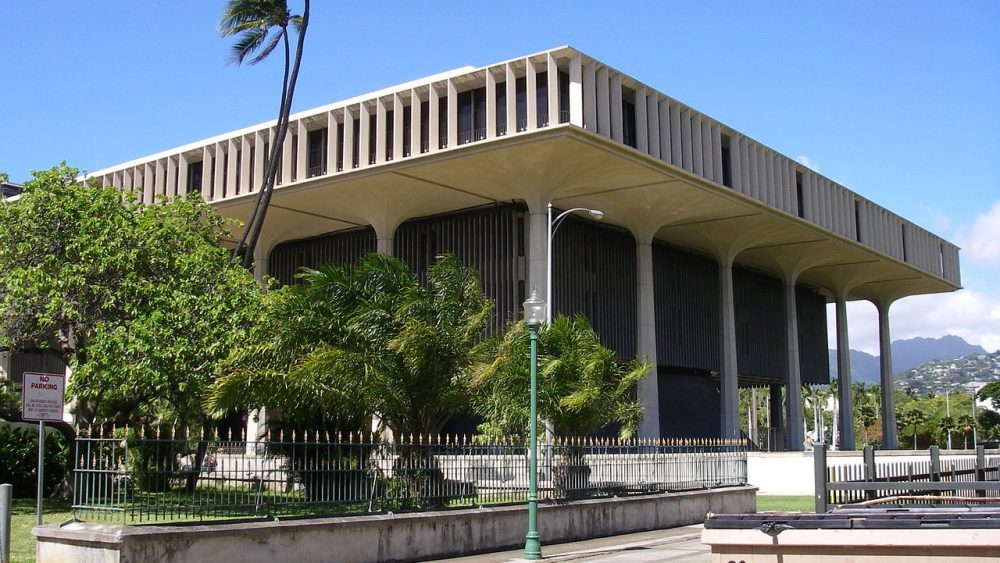November 9, 2020 •
Puerto Rico Elects Pedro Pierluisi as Governor
Pedro Pierluisi of Puerto Rico’s pro-statehood New Progressive Party won a majority of votes to become the U.S. territory’s next governor, according to official results released in the late evening on November 7. With 100% of precincts reporting, Pierluisi received […]
Pedro Pierluisi of Puerto Rico’s pro-statehood New Progressive Party won a majority of votes to become the U.S. territory’s next governor, according to official results released in the late evening on November 7.
With 100% of precincts reporting, Pierluisi received nearly 33% of votes compared with nearly 32% obtained by Carlos Delgado of the Popular Democratic Party, which supports the current territorial status.
The results come four days after Puerto Rico held general elections, an unusual delay blamed on a record number of early and absentee votes that overwhelmed officials.
November 5, 2020 •
Oklahoma City Voters Approve Proposition on City Employees Accepting Gifts

Voters in Oklahoma City approved a proposition relating to accepting things of value from private businesses. Proposition 9 amends the city charter to reorganize and update provisions banning city employees from accepting things of value from private businesses on better […]
Voters in Oklahoma City approved a proposition relating to accepting things of value from private businesses.
Proposition 9 amends the city charter to reorganize and update provisions banning city employees from accepting things of value from private businesses on better terms than available to the general public.
Article IV, Section 12 of the Oklahoma City Charter prohibits city officers and employees from directly or indirectly accepting or receiving any salary, commission, compensation, free or discounted service, or other thing of value of any kind from certain specified privately-owned businesses within the city on terms more favorable than is granted to the public generally.
Proposition 9 provides an exception allowing the granting of a city franchise or other city contract conditioned upon free service to the city and to its officers and employees while they are engaged in the performance of their duties.
Proposition 9 took effect when passed 70% to 30% on November 3.
November 5, 2020 •
Oklahoma City Voters Approve Proposition Relating to Mayoral and City Council Elections
Voters in Oklahoma City approved a proposition relating to mayoral and city council elections. Proposition 1 amends the city charter by changing the names of “primary” and “general” elections to “general” and “runoff” elections. Additionally, the proposition sets the regular […]
Voters in Oklahoma City approved a proposition relating to mayoral and city council elections.
Proposition 1 amends the city charter by changing the names of “primary” and “general” elections to “general” and “runoff” elections.
Additionally, the proposition sets the regular general election date for mayoral elections to the second Tuesday in February 2022 and every four years going forward instead of existing primary mayoral election dates set as the second Tuesday in March.
Proposition 1 also sets the regular general election date for city council elections as the second Tuesday in odd-numbered years instead of the existing primary city council election date set as the first Tuesday in March.
The regular runoff election date for both mayoral and city council elections would be set to the first Tuesday in April immediately following the general election.
Lastly, the proposition adds specific processes for if the city council creates more than eight city wards and provides elected officials take officer four weeks rather than one week after the runoff election.
Proposition 1 took effect when passed 73% to 27% on November 3.
November 5, 2020 •
Laredo Voters Approve Proposition to Exempt Mayor from Political Activity Prohibition
Voters in Laredo approved a proposition exempting certain public officials from the prohibition on participating in political activity. Proposition D amends the city charter to explicitly exempt the mayor, in addition to individual city council members, from the prohibition against […]
Voters in Laredo approved a proposition exempting certain public officials from the prohibition on participating in political activity.
Proposition D amends the city charter to explicitly exempt the mayor, in addition to individual city council members, from the prohibition against political activity by city employees.
Proposition D took effect when passed 70% to 30% on November 3.
November 5, 2020 •
Laredo Voters Approve Mayoral and City Council Recall Proposition
Voters in Laredo, Texas approved a proposition to trigger an automatic recall for certain criminal convictions of mayor and city council members. Proposition A amends the city charter to require city council members and mayors convicted of non-felony crimes to […]
Voters in Laredo, Texas approved a proposition to trigger an automatic recall for certain criminal convictions of mayor and city council members.
Proposition A amends the city charter to require city council members and mayors convicted of non-felony crimes to be automatically recalled.
Additionally, these non-felony crimes will be determined based on the district court’s assessment of whether the crime involves “moral turpitude.”
The proposition took effect when passed 77% to 23% on November 3.
November 4, 2020 •
Puerto Rico Awaits Final Results in Tight Gubernatorial Race
Voters across Puerto Rico await final results on November 4 following elections that saw long lines and produced a tight gubernatorial race. Candidate Pedro Pierluisi holds a slight lead over Carlos Delgado Altieri and several other candidates in the race […]
Voters across Puerto Rico await final results on November 4 following elections that saw long lines and produced a tight gubernatorial race.
Candidate Pedro Pierluisi holds a slight lead over Carlos Delgado Altieri and several other candidates in the race for governor.
Pierluisi, the candidate for the pro-statehood New Progressive Party, is the territory’s former non-voting representative in Congress.
He also briefly served as governor following huge street protests last year that led to the resignation of former Gov. Ricardo Rosselló.
Rosselló was forced out of office in August 2019 amid mass street protests and corruption allegations.
His successor, Wanda Vázquez Garced, battled the pandemic and earthquakes until Pierluisi won the gubernatorial primary earlier this year.
Pierluisi also trailed gubernatorial opponents Juan Dalmau of the Puerto Rican Independence Party, Alexandra Lúgaro of Citizen Victory Movement, César Vázquez of the Dignity Project, and independent candidate Eliezer Molina.
With more than 95% of the votes counted, Pierluisi leads Altieri 32.40% to 31.36%.
November 4, 2020 •
New Mexico Voters Approve Public Official Term Limits Amendment
On November 3, voters in New Mexico approved a constitutional amendment to allow the legislature to adjust the term of a state, county, or district officer. House Joint Resolution 8, or Amendment 2, allows the legislature to adjust the term […]
On November 3, voters in New Mexico approved a constitutional amendment to allow the legislature to adjust the term of a state, county, or district officer.
House Joint Resolution 8, or Amendment 2, allows the legislature to adjust the term of a state, county, or district officer to align or stagger the election of officers for a particular state, county, or district office throughout the state.
Additionally, the amendment will clarify that officers elected to fill a vacancy in office must take office on the first day of January following their election.
The amendment became effective upon voter approval.
As of 7:00 a.m. November 4, with 96% of the precincts reporting, the amendment passed 64% to 35.7%.
November 4, 2020 •
Arkansas Voters Approve Legislative Term Limits Amendment
On November 3, voters in Arkansas approved a constitutional amendment to impose term limits for state legislators. Issue 2 creates term limits of 12 consecutive years for state legislators with the opportunity to return after a four-year break. Arkansas previously […]
On November 3, voters in Arkansas approved a constitutional amendment to impose term limits for state legislators.
Issue 2 creates term limits of 12 consecutive years for state legislators with the opportunity to return after a four-year break.
Arkansas previously had a 16-year lifetime term limit for state legislators.
The 12-year limit will apply to anyone elected in 2021 or after.
Those first elected to the legislature before 2021 will keep the state’s existing term limit of 16 years, but they will be eligible to run for election again after four years.
As of 7:00 a.m. November 4, with more than 95% of the precincts reporting, the amendment passed 55.4% to 44.6%.
November 4, 2020 •
Utah Voters Approve Session Start Date Amendment

Utah Capitol Building - Jkinsocal
On November 3, voters in Utah approved a constitutional amendment to modify the commencement date of the annual Utah legislative session. Senate Joint Resolution 3, or Amendment F, amends the commencement of the legislature from the fourth Monday in January […]
On November 3, voters in Utah approved a constitutional amendment to modify the commencement date of the annual Utah legislative session.
Senate Joint Resolution 3, or Amendment F, amends the commencement of the legislature from the fourth Monday in January to a day in January designated by state statute.
Previously, if the state legislature wished to change the session start date, lawmakers would need to amend the state constitution by passing a constitutional amendment by a two-thirds vote of the legislature.
The amendment would then require statewide voter approval.
Under Amendment F, the legislature will be able to change the session start date in state statute, which requires a simple majority vote in the legislature and does not require voter approval.
The amendment also excludes state holidays that are not also federal holidays from counting toward the 45-day limit of annual general sessions.
Amendment F will take effect January 1, 2021.
As of 7:00 a.m. November 4, with more than 76% of the precincts reporting, the amendment passed 66.8% to 33%.
November 4, 2020 •
Utah Voters Elect Spencer Cox in Gubernatorial Race

Utah Capitol Building - Jkinsocal
Incumbent Lt. Gov. and Republican Spencer Cox defeated candidate Chris Peterson 64% to 30% in Utah’s gubernatorial race. Cox, the top finisher among state Republican convention delegates, beat three GOP candidates in the June 30 party primary. Those are former […]
Incumbent Lt. Gov. and Republican Spencer Cox defeated candidate Chris Peterson 64% to 30% in Utah’s gubernatorial race.
Cox, the top finisher among state Republican convention delegates, beat three GOP candidates in the June 30 party primary.
Those are former Gov. Jon Huntsman Jr., former Utah House Speaker Greg Hughes, and former Utah Chairman Thomas Wright.
Peterson, a University of Utah law professor who worked on consumer issues in the Obama administration, won the Democratic nomination outright at his party’s state convention and did not face a primary in his first run for public office.
Cox will succeed Republican Gov. Gary Herbert.
Herbert chose not to run for reelection after more than a decade in office and endorsed Cox in the hotly contested GOP gubernatorial primary.
June 30, 2020 •
Louisiana Lawmakers Winding Down Special Session
Louisiana lawmakers have until final adjournment at 6 p.m. on June 30 to pass the government spending plan for the fiscal year that begins on July 1. In the special session premised in large part on COVID-19 relief, lawmakers gave […]
Louisiana lawmakers have until final adjournment at 6 p.m. on June 30 to pass the government spending plan for the fiscal year that begins on July 1.
In the special session premised in large part on COVID-19 relief, lawmakers gave final legislative approval June 29 to send $250 hazard pay checks to up to 200,000 frontline workers.
Qualifying jobs include health workers, emergency, fire and law enforcement personnel, bus drivers, garbage workers, and grocery store and convenience store workers.
Additionally, negotiations on the state budget continue into the final day of the special session.
June 22, 2020 •
New Mexico Supreme Court Issues Ruling to Ban
In a 3-2 decision on June 16, the New Mexico Supreme Court denied a request allowing lobbyists and public into the Capitol, known as the Roundhouse, during the special legislative session beginning June 18. Chief Justice Judith Nakamura described the […]
In a 3-2 decision on June 16, the New Mexico Supreme Court denied a request allowing lobbyists and public into the Capitol, known as the Roundhouse, during the special legislative session beginning June 18.
Chief Justice Judith Nakamura described the decision as a difficult ruling to make. However, Nakamura concurred with Justices Barbara Vigil and Michael Vigil in denying the petition. 24 lawmakers submitted this proposal which would have opened the Roundhouse to lobbyists and the public for the special session.
The petition argued that prohibiting lobbyists from entering the Roundhouse violates the constitutional requirement to make all legislative sessions public.
New Mexico’s constitution provides all sessions of each house must be public. Justices challenged attorneys on both sides to define the term “public” and explain in detail what constitutes a public session.
Justice C. Shannon Bacon expressed concern about large parts of the state not having broadband. She also emphasized that thousands of people do not have access to computers, describing New Mexico as a technological desert.
The Supreme Court concluded virtual proceedings balance the need to protect the public from the public health concerns of COVID-19 with the need to ensure the legislative session remains open and transparent.
The ruling means those who wish to follow the session will watch the hearings from their computer screens. This will be current reality, rather than gathering in committee rooms and House and Senate galleries.
The public will be able to speak at the discretion of the House committee chairs via Zoom video conference call. However, the public will only be allowed to send emails, rather than joining a video conference, to address the Senate’s committee.
Beginning June 18, lawmakers will begin debating how to shore up an estimated $2 billion shortfall in projected revenues for the fiscal year 2021 budget. This shortfall is largely due to the pandemic-related government shutdown.

The Hawaii Ethics Commission approved a package of proposals on June 18. These proposals amend and adopt portions of the Hawaii Administrative Rules related to lobbying and gifts. The amendments in chapters one through six address the Commission’s operations and […]
The Hawaii Ethics Commission approved a package of proposals on June 18. These proposals amend and adopt portions of the Hawaii Administrative Rules related to lobbying and gifts.
The amendments in chapters one through six address the Commission’s operations and procedures. Additionally, chapters seven through 10 now include sections on “Lobbying” and “Gifts and Fair Treatment”.
The proposed rules do not purport to amend any statutes. Rather, they are designed to interpret and execute the statutes enacted by the Legislature.
Section 21-10-5
Section 21-10-5, statement of contributions and expenditures, addresses the statutory requirement that statements of contributions and expenditures must be filed by up to three different entities. This could be the client, the employing organization, and the lobbyist. Or, in the case of lobbyists employed in-house by the client, the client or employing organization and the lobbyist.
This rule creates a single, client-based report rather than requiring separate reports from the client, the employing organization, and the lobbyist. This single, client-based reporting method avoids double or sometimes triple reporting. Additionally, it eliminates the practice, when clients or employing organizations cover expenditures, of having lobbyists submit reports listing “zero” expenditures.
Section 21-10-1
Section 21-10-1 contains definitions of “direct lobbying” and “grassroots lobbying” to demonstrate that lobbying can be both direct and indirect, consistent with the definition of lobbying in Section 97-1 of the Hawaii Revised Statutes. Under Rule 21-10-1, direct lobbying is defined as any oral or written communication with a legislator, an employee, intern, or volunteer of the legislature or an agency that would appear to a reasonable person to be an attempt to influence legislation or rule-making.
Additionally, grassroots lobbying is defined as any oral or written communication directed at any member of the public that expresses an opinion about existing or potential legislation, administrative rule, or ballot issue and includes an explicit or implied call to action.
Section 21-7-6
Section 21-7-6, valuation of gifts, defines the value of a gift as the cost that a member of the public would reasonably expect to incur to purchase it. For example, If the face value of a ticket to an event is $100, but the event is sold out and tickets on the secondary market are $500 at the time the ticket is offered as a gift, the value of the ticket is $500.
The rules must now be approved by the Department of the Attorney General, and then by the governor. Once approved by both offices, they will be posted with the Office of the Lieutenant Governor for 10 days before becoming effective.
June 16, 2020 •
Colorado General Assembly Adjourns June 15
The Colorado Legislature adjourned sine die on June 15 after an unprecedented session. The session originally began on January 8 with a focus on school safety and funding education. On March 14, the session was postponed to curb the spread […]
The Colorado Legislature adjourned sine die on June 15 after an unprecedented session.
The session originally began on January 8 with a focus on school safety and funding education. On March 14, the session was postponed to curb the spread of COVID-19.
When lawmakers resumed in May, the session quickly shifted to balancing the state budget in response to the economic effects of the COVID-19 pandemic.
Lawmakers were also able to pass legislation introducing a sweeping set of reforms for law enforcement in the state.
This reform is including a ban on chokeholds and a provision requiring officers to intervene if they see the use of excessive force.
With the legislative work wrapped up, the focus is now shifting to the November election.
Gov. Jared Polis must still give his final approval on many of the bills approved in the final weeks by the state legislature.
State and Federal Communications, Inc. provides research and consulting services for government relations professionals on lobbying laws, procurement lobbying laws, political contribution laws in the United States and Canada. Learn more by visiting stateandfed.com.


